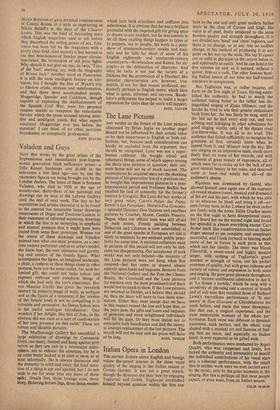Tim current dispute about English and foreign voices sharpened interest
in the sheer vocal quality of the singing in the Italian season at Covent Garden. It was not a great season, though the directors did their best by engaging Tagliavini and Gobbi. Tagliavini established himself beyond question within the first few
bars as the one and only great modern Italian tenor in the class of Caruso and Gigli. His voice is of steel, finely tempered to the same flawless quality and strength throughout. It is not divided into 'head' and 'chest' registers, and there is no change, or at any rate no audible change, in his method of producing it at any point on his way up the scale. His top D comes out as solid in physique as the octave below it. and apparently as easily. And he can hold it for five minutes on end, as it seemed, without a quiver, firm as a rock. The other famous bawl- ing Italian tenors of our time arc half-trained amateurs in comparison.
But Tagliavini was, or rather became, off form on the first night of 'loser'. Having estab- lished his authority, he had to watch the audience taking better to the rather less dis- tinguished singing of Zinka Milanov, and the harder he tried to win their greater enthusiasm back from her, the less finely he sang, until in the last act he had every stop out, and was sobbing and indulging in other substitutes for good singing worthy only of his distant rival you-know-who. It was all to no avail. The audience that failed sufficiently to recognise his greatness at first, certainly knew when he lapsed from it, and Milanov won the day. She was singing on an impressive scale, much more finely than on some of her records, and with moments of great beauty of expression, all of which went far to make up for the lack of any great natural beauty in her voice, and deserved some at least—but surely not all—of the audience's cheers.
Rigoletto was dominated by Gobbi, who showed himself once again one of the supreme all-round masters (vocal, musical and dramatic) of his art and his part, with which he was able to do whatever he liked, and bring it off—ex- cept, for my taste, in Act 2, where he dealt rather too freely with the notes. Hilde Gueden seems on the first night to have, disappointed many, but I heard her on the second night and found her splendid in almost everything except 'Caro Nome' itself. Her transformation into an Italian singer seemed to me complete, and completely successful, and I look forward to hearing much more of her in future in such parts as this, which suit her ideally. The tenor was Nicola Filacuridi, a sweet-toned and highly musical singer, with nothing of Tagliavini's grand manner or strength of voice, nor his perfect evenness of quality, but with great richness and variety of colour and expression in both voice and singing. He gave great pleasure throughout, and it became spellbound admiration in Act 4, at 'La donna e mobile,' which he sang with a sensitivity of phrasing and a control of breath and of soft tone that matched those of Richard Lewis's marvellous performance of '11 mio tesoro' in Don Giovanni at Glyndebourne the week before, and made this tenor showpiece, like that one, a magical experience, and the most memorable moment of the whole per- formance. Each verse was different in dynamic treatment, each perfect, and the whole song shaped with a musical art and fineness of feel- ing that no tenor, and especially no Italian tenor, is ever expected to be gifted with.
Both performances were conducted by Argeo Quadri, who was competent and lively, but lacked the authority and personality to mould the individual contributions of his vocal stars into a coherent performance, with the result that in neither work were we ever carried away by the music, only by the great moments in the singing. But this is perhaps all that most people expect, or even want, from an Italian season.


















































 Previous page
Previous page